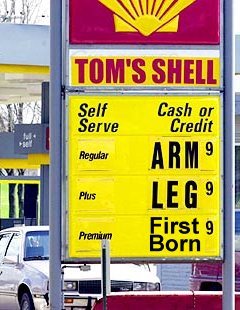A poor economy and out-of control gas prices

A poor economy, or the perception that the economy is poor, is usually a bad omen in American politics for the party in power. Andrew Jackson is perceived as a military hero and a champion of democracy, but his relentless attacks on the national bank sent this country into an economic panic that rivaled the Great Depression, only not on a worldwide scope. His successor and former Vice-President, Martin Van Buren, was easily defeated by the candidate of the new Whig Party, William Henry Harrison, because he was seen as an uncaring, fancified dandy who didn’t care for the lot of the common people. And, of course, the classic case is that of the Republicans who, after presiding over the “Roaring 20’s,” were cast from power by Franklin D. Roosevelt in 1932 because Herbert Hoover was perceived to be unwilling to take any steps to involve the federal government in jobs creation, relief and other welfare programs, and social security. Conservative icon Ronald Reagan refused to accept that runaway inflation and skyrocketing interest rates were an inescapable fact of life, and although his economic program was mocked as “Reaganomics,” by lowering spending and cutting taxes, the US economy got back on its feet.
It should be apparent that economic trends are typically used by the party out of power to convince Americans to change direction. It also should be no surprise that in the state of Michigan, where the economy is (arguably) the worst in the nation, Republican candidates for governor (Dick DeVos) and US Senator (Mike Bouchard) are running on the premise that Granholm’s and Stabenow’s policies and records are causing Michigan’s economy to stagnate. Similarly, Democrats nationally are trying to convince the voting public that the economy is bad nationwide and that things will only get better when Democrats control congress.
The big problem with that whole scenario is that, unlike America of the Great Depression or of the Carter years, and unlike Michigan, whose unemployment rate really is 150% of that national rate, the American economy has been experiencing continuous growth, including jobs creation and nearly full employment (4.7% nationally). The single factor, however, that has fed the perception that the economy really isn’t as strong as all the leading indicators would show, is the out-of-control rise in gasoline prices. Aren’t you sick of paying $3.00 per gallon for gas? Then vote Democrat because “we have a plan” and “by the way, I invented the internet while my friend here was fighting in Vietnam.”
Oh-oh. Problems with this scenario. Gas prices are in precipitous decline. Some even predict that the price of a gallon of gas will fall as low as $1.15/gallon. Of course, some commentators accuse the big oil companies of manipulating prices to get their Republican buddies re-elected, and then they’re going to stick it to us again. Other commentators say that lower gas prices are horrible for the environment and for planet earth because we will never learn to use mass transit and go green if we get gas cheaply. Some are even surprised that, after a month of descending gas prices, that Americans haven’t run right out to the local Ford dealer and bought a new SUV so they can guzzle gas again.
Conspiracy theorists need to take off the tinfoil hats and face reality. We operate in a free market, where prices are determined by the law of supply and demand. In commodities like crude oil, the cost of a barrel is often set by speculators and futures traders, who buy delivery contracts at a high price when they suspect an interruption in the supply chain. That’s why occasionally we will see gas prices shoot up by 30 cents in one day. Maybe it was tension in the Middle East over Israel’s fight with Hezbollah, or the asinine president of Iran shooting his mouth off about threatening to wipe Israel off the map (sorry, the “Zionist entity”). At times, the threat and the reality of the destructive force of hurricanes (Katrina, Rita) which temporarily put oil refinery operations in the Gulf region on hold, threaten supply. This summer, BP had to shut down one of its Alaskan pipelines over deterioration and lack of proper maintenance, and prices went up on the basis of futures speculation. But now what do we see? Tensions in the Middle East recede. Despite every attempt by anti-American and freedom-hating jihadists and their allies in the media to prevent it, Iraq continues to march toward democracy. No hurricanes so far this season. And a new discovery of a huge oil deposit deep in the Gulf of Mexico offers hope that American domestic production of oil will increase by 50%. So all those futures traders who bought oil at a high price, counting on supply interruption, now must sell to get rid of their contracts, because there is MORE SUPPLY than DEMAND.
If this issue is of particular interest to you, or if you want to explore in greater detail the issues behind gas prices, here is a link to a Department of Energy site that will explain it all. Just remember that any politician who claims that they will be able to “lower gas prices” has only one real course of action—to remove taxes on gasoline as a temporary relief measure until the markets, and the law of supply and demand, self-correct.




